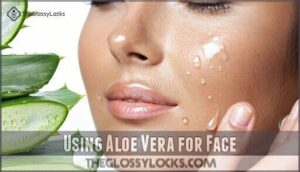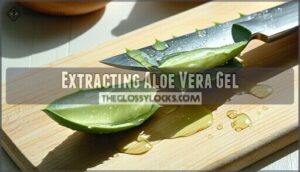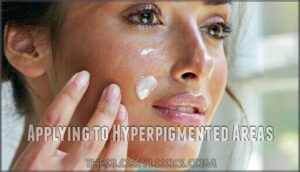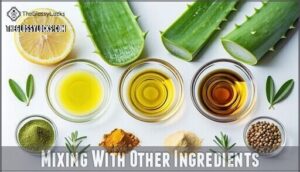This site is supported by our readers. We may earn a commission, at no cost to you, if you purchase through links.
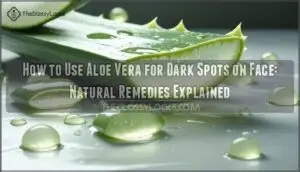
The magic lies in compounds like aloin and aloesin, which can lighten hyperpigmented areas by slowing melanin production.
Apply the gel directly to the dark spots after cleansing your face.
You can also mix it with a bit of lemon juice or honey for added brightening power.
Leave it on for 20 minutes or, if your skin agrees, overnight.
Just don’t expect miracles overnight—consistency is key.
Curious about extra tricks to boost its effectiveness? Stay tuned!
Table Of Contents
- Key Takeaways
- Aloe Vera for Dark Spots
- Using Aloe Vera for Face
- Preparing Aloe Vera Gel
- Applying Aloe Vera Gel
- Safety and Effectiveness
- Frequently Asked Questions (FAQs)
- Will aloe vera remove dark spots?
- How do you use aloe vera to clear spots?
- Can I leave aloe vera gel on my face overnight?
- Does aloe vera lighten dark spots?
- Can aloe vera remove black spots?
- Should you use aloe vera on your face?
- Can aloe vera be used on sensitive skin?
- What are the side effects of aloe vera?
- Should aloe vera be left on overnight?
- Does aloe vera need to be diluted?
- Conclusion
Key Takeaways
- Apply fresh aloe vera gel directly to clean skin, focusing on dark spots, and use it consistently for noticeable results.
- Mix aloe vera with natural ingredients like lemon juice or honey to boost its skin-brightening effects.
- Leave a thin layer of aloe vera gel on your skin overnight for deeper hydration and better absorption.
- Always patch test aloe vera before use to check for irritation, especially if you have sensitive skin.
Aloe Vera for Dark Spots
You can use aloe vera to help reduce the appearance of dark spots on your face with its natural skin-lightening properties.
Its active compounds, like aloin and aloesin, target melanin production, promoting a more even skin tone over time.
Benefits of Aloe Vera
Aloe vera does wonders for your skin, tackling everything from dark spots to dryness.
Nature’s multitasker, aloe vera nourishes skin by fading dark spots, soothing dryness, and hydrating for a radiant, refreshed glow.
Its natural goodness offers:
- Skin Lightening: Helps fade hyperpigmentation and facial dark spots.
- Acne Reduction: Soothes inflammation and speeds up healing.
- Hydration Boost: Deeply moisturizes for supple skin.
- Anti-Aging & Wound Healing: Reduces fine lines and supports skin repair.
It’s nature’s way of pampering your skin!
Contains Aloin and Aloesin
Aloin and aloesin, two powerful compounds in aloe vera, work wonders on dark spots.
Aloin helps fade hyperpigmentation by targeting melanin, while aloesin prevents new spots by inhibiting melanin formation.
Their chemical properties guarantee skin protection through antioxidant and anti-inflammatory effects.
With proper concentration levels, these natural remedies offer a gentle, effective approach to reducing dark spots without harsh chemicals.
Inhibits Melanin Production
Aloin effectiveness lies in destroying melanin cells, while aloesin works by halting tyrosinase, a key enzyme that drives melanin production.
Aloin fades dark spots by breaking down melanin, while aloesin halts tyrosinase, stopping new pigment formation for a brighter complexion.
Together, they’re a powerhouse against hyperpigmentation and dark spots.
One such ingredient is glycolic acid, known for its exfoliating properties.
Need specifics?
- Melanin reduction helps fade existing spots.
- Aloesin mechanisms prevent new discoloration.
- Tyrosinase inhibition targets excess pigment formation.
- Dark spot prevention becomes achievable with consistency.
Moisturizes and Heals
For tackling dark spots and maintaining healthy skin, aloe vera gel is a multitasker.
Packed with lignin, it deeply hydrates, preserves skin elasticity, and combats dryness.
Its anti-fungal properties also help reduce acne while soothing irritations.
By repairing damaged skin and reducing hyperpigmentation, it gently fades skin discoloration, leaving your face refreshed and rejuvenated, it’s nature’s little miracle worker with great benefits for skin, including being a natural way to maintain healthy skin.
Using Aloe Vera for Face
Using aloe for your face can be simple, yet incredibly rewarding. Packed with skin-loving compounds, it’s perfect for hyperpigmentation and dark spots. Whether it’s the gel’s soothing touch or its moisturizing magic, the benefits of aloe vera are hard to ignore. Applying it’s easy, making it a go-to remedy.
Aloe vera’s anti-inflammatory properties can also reduce redness.
Here’s how you can use it effectively:
- Direct application: Apply fresh aloe vera gel to your clean skin 2-3 times daily, focusing on problem areas.
- Overnight treatment: Leave a thin layer on overnight for deeper melanin reduction.
- Massage magic: Gently massage the gel with circular motions for better absorption.
While aloe works wonders for many, monitor for adverse skin reactions, as its effects vary by skin type.
Preparing Aloe Vera Gel
To prepare aloe vera gel, start by choosing mature leaves from a healthy plant for the best results.
Extract the clear gel inside, store it properly, and you’re ready to brighten those dark spots.
Choosing Mature Aloe Vera Plants
When picking an aloe vera plant, consider leaf thickness and age.
Older plants (3+ years) contain higher aloin concentration, boosting aloe vera benefits for dark spots.
Thick, outer leaves are ideal for maximum harvesting.
Here’s a guide:
| Factor | Ideal Choice | Why It Matters |
|---|---|---|
| Plant Age | 3+ years | Higher aloin concentration |
| Leaf Thickness | Thick leaves | More gel for use |
| Propagation Methods | Mature plants | Established nutrients |
Choose wisely!
Extracting Aloe Vera Gel
Once you’ve got thick, mature leaves, extracting aloe vera gel is simple.
Slice off the spiky edges, then peel away the top layer with a knife or spoon. Scoop out the gel carefully—it’s packed with benefits like high aloin concentration.
You can also find pure aloe gel online.
- Use clean extraction tools to avoid contamination.
- Focus on preserving maximum gel yield.
- Enjoy aloe vera uses for brighter skin!
Storing Aloe Vera Gel
After extracting aloe vera gel, proper storage is key.
Use airtight storage containers to prevent oxidation.
Homemade gel lasts 7 days in the fridge, while store-bought versions last longer.
Always refrigerate for freshness, as this boosts shelf life.
Selecting the right storage products can extend the gel’s usability.
Compare storage tips below:
| Gel Type | Shelf Life (Fridge) | Oxidation Risk |
|---|---|---|
| Homemade Gel | 7 Days | High Without Care |
| Store-Bought | 1-2 Years | Low |
The table provides a clear comparison of gel types and their respective characteristics, helping you make an informed decision about storage products.
Applying Aloe Vera Gel
Applying aloe vera gel is simple and can make a difference in managing dark spots.
You just need to use a small amount on clean skin and let its healing properties work.
Applying to Hyperpigmented Areas
Once your aloe vera gel is ready, cleanse the area around your dark spots to guarantee it’s free of dirt.
Gently apply a thin layer of gel, focusing on hyperpigmented areas, use circular motions and avoid heavy layers.
Application frequency matters—do this two to three times daily.
For deeper absorption, leave it on overnight and rinse in the morning.
Mixing With Other Ingredients
Boost aloe vera’s impact on dark spots by blending it with natural ingredients.
Try these combos for effective hyperpigmentation treatment:
- Lemon juice for brightening and tightening pores.
- Turmeric mask to lighten and calm skin.
- Honey benefits for hydration and antibacterial properties.
- Tea tree oil or ACV exfoliation to fight acne and remove dead cells.
Consider exploring aloe vera lemon products for convenience. Aloe vera gel shines with these natural remedies!
Leaving on Skin Overnight
Letting aloe vera gel work as an overnight treatment boosts skin penetration and product absorption.
Apply a thin layer to hyperpigmented areas before bed for overnight hydration and to target dark spots or hyperpigmentation.
This method leverages aloe vera’s benefits while you sleep, but watch for potential risks like irritation.
Always patch-test first for safety.
Massaging Into Affected Areas
To boost the absorption rate of aloe vera gel, gently massage it into dark spots using circular motions.
Apply gentle pressure to avoid irritating skin sensitivity.
Spend about 1-2 minutes per area, focusing on hyperpigmentation.
A consistent massage duration enhances spot reduction by helping the gel penetrate deeper.
Treat it like pampering, not scrubbing—your skin will thank you!
Aloe vera’s anti-inflammatory properties can also help soothe the skin during application.
Safety and Effectiveness
Using aloe vera for dark spots is generally safe, but it’s important to check for potential allergies or adverse reactions.
Although its skin-lightening properties show promise, results can vary and aren’t guaranteed for everyone, making it crucial to have realistic expectations about the potential outcomes of using aloe vera.
Potential Adverse Reactions
When applying aloe vera for dark spots, watch for allergy symptoms like redness, itching, or swelling.
Skin irritation is rare but possible, especially if you’re allergic to the Liliaceae family. A patch test is your safety net—try a small spot first.
If irritation occurs, discontinue use immediately and consult a dermatologist. Better safe than sorry!
To further minimize irritation, consider pre-shave skin preparation before applying aloe vera, and always prioritize being better safe than sorry.
Limited Scientific Evidence
Research on aloe vera’s efficacy for dark spots is limited. While aloin and aloesin show potential, clinical trials are unconvincing.
Topical application faces challenges like:
- Inability to penetrate deeply to target melanocytes.
- Unpredictable dosage effects on skin pigmentation.
- Minimal evidence supporting long-term results.
- Individual variability in hyperpigmentation responses.
Combine aloe vera use with realistic expectations for visible changes.
Combining With Other Treatments
Combine aloe vera with treatments like lemon juice for skin brightening or turmeric masks to target dark spots.
Tea tree oil helps acne, while honey adds soothing benefits.
Apple cider gently exfoliates hyperpigmented areas, and these combinations boost aloe vera’s skin-lightening effects.
Experiment carefully and patch test first to avoid irritation, as mixing creates synergy for better results, and always prioritize your skin’s health with gentle and informed use of natural ingredients.
Frequently Asked Questions (FAQs)
Will aloe vera remove dark spots?
Aloe vera can help fade dark spots over time, but it’s not a miracle cure.
Its natural compounds reduce pigmentation and soothe skin.
Consistency is key, and results may vary based on skin type, with consistency being crucial for optimal outcomes.
How do you use aloe vera to clear spots?
Start with fresh aloe vera gel, apply a thin layer to dark spots, and leave it for 15-30 minutes before rinsing.
For better results, try mixing it with lemon juice or turmeric.
Can I leave aloe vera gel on my face overnight?
Yes, you can leave aloe vera gel on your face overnight.
It hydrates deeply while working on dark spots.
Just do a patch test first to avoid surprises like redness or irritation.
Does aloe vera lighten dark spots?
When life gives you dark spots, aloe vera might help.
Its aloin and aloesin compounds reduce melanin production and lighten skin.
While it’s no magic eraser, consistent use can fade hyperpigmentation over time.
Can aloe vera remove black spots?
Black spots might fade with aloe vera since it contains natural compounds like aloin and aloesin that reduce melanin.
However, it won’t work miracles overnight, and consistent use is key for noticeable results.
Should you use aloe vera on your face?
You can use aloe vera on your face, but test it first.
It’s great for soothing, hydrating, and reducing spots, but don’t rush—some folks might experience irritation, so listen to your skin’s cues.
Can aloe vera be used on sensitive skin?
Aloe vera can work on sensitive skin, but patch test first.
Apply a small amount to your arm, wait 24 hours, and check for irritation.
If redness or itching occurs, stop use immediately.
What are the side effects of aloe vera?
It’s rare, but aloe vera can cause skin irritation that feels like your face went to war with a cactus—redness, itching, or even a rash.
Patch test first to avoid any nasty surprises!
Should aloe vera be left on overnight?
Leaving aloe vera on overnight is generally safe and can boost hydration, but always patch test first.
If your skin feels irritated or itchy, rinse it off immediately.
Everyone’s skin reacts differently, so start small.
Does aloe vera need to be diluted?
You don’t always need to dilute aloe vera, but it depends on your skin.
If irritation or sensitivity happens, mix it with water or a gentle moisturizer.
Pure aloe works fine for most people!
Conclusion
Wondering if aloe vera can really tackle dark spots on your face?
With its natural compounds like aloin and aloesin, aloe vera helps reduce hyperpigmentation by slowing melanin production.
Apply it consistently to problem areas or mix it with ingredients like honey for extra benefits.
While results take time, its gentle, soothing properties make it a safe choice for most, requiring patience and regular use to make a noticeable difference.
Why not give it a try?
- https://onlinelibrary.wiley.com/doi/abs/10.1111/j.1468-2494.2008.00432.x
- https://www.ncbi.nlm.nih.gov/pubmed/12372097
- https://www.mayoclinic.org/drugs-supplements-aloe/art-20362267
- https://apsjournals.apsnet.org/doi/abs/10.1094/PDIS-03-13-0314-PDN
- https://pdfs.semanticscholar.org/f1ef/afebaf7efec52a7e27c8137f617b600f94b6.pdf


